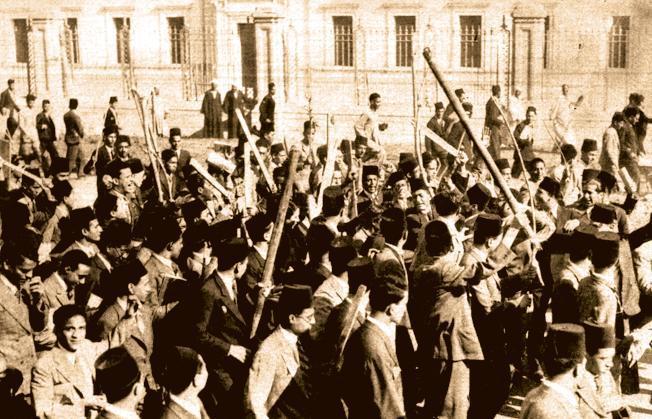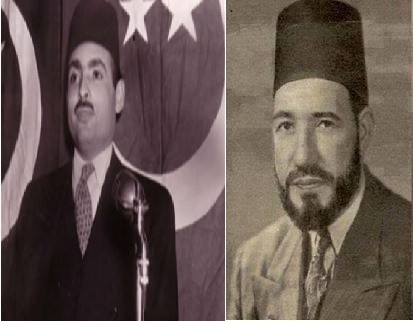Misr El-Fatah Party (The Young Egypt) was formed October 1933 by a group of university students, as a “radical nationalist” party with “religious elements” by its leader Ahmed Husayn.
Its formation at the time was a reflection of the youth’s conviction that Egypt was in dire need of a leadership that would take the helm of reformism. The youth were very disillusioned by the constitutional system whether due to its inefficiency or the high volume of violations stemming from it. Their enthusiasm promoted them to express themselves within the group. The first leader of the group was a young man named Ahmed Husayn, who about 22 years old. Husayn along with a group of his fellow graduates of the Faculty of Law, headed by Mustafa El Wakil—Husayn’s deputy—and Fathi Radwan—the Party’s secretary—constituted the membership of the nascent party. (12)
No political body, in Egypt’s political history, was like Misr El-Fatah in its political instabilities and intellectual transformations, moving from faith in the Arab nationalism into aims to make Egypt an “empire”—the empire consisting of Egypt and Sudan—that would ally with other Arab countries and “serve as the leader of Islam”.
Later on, the Party turned to preach fascism as a role model, passing through extreme enthusiasm for the Islamic Caliphate state, to fall into the clutches of the socialism in the last stint of the Party’s lifespan. Apart from the very few months prior to July Revolution 1952, constancy of loyalty to King Farouk was one of the central planks of Ahmed Husayn and his supporters; however, the thing that Misr El-Fatah never changed at all was its constant hostility to the Al-Wafd Party and its leaders[1].
Dr. Abdul Azim Ramadan gives a brief, objective assessment of the movement and its dramatic instabilities, saying: “The political ebb and flow of Ahmed Husayn was considered one of his salient features. In the very first stage of his political life, he moved from the extreme moderation to the utmost limit of extremism, all in no more two years.” (13)
More often, the connection between Misr El-Fatah and the Brotherhood had been characterized by much tension and conflict, at some times, and a little bit of collaboration and coordination, at other times.
The early clash between the two sides was clearly manifested in the El-Banna’s evaluation of Misr El-Fatah, as he hailed its youth “as immature and unqualified to call for ‘a true and right Islamic path’. However, let time takes its due course of accomplishing things. Suffice us time as an arbiter among us as it is the best warranty for testing and distinguishing among us.” (14)
In welcome to Palestinian delegation, members of Misr El-Fatah were chanting the following mantra, saying: God is the greatest and all glory is due to Egypt. In reaction, one Brotherhood-linked Newspaper wrote that “this is a confusion of Islamic call with nationalist calls, especially as Ahmed Husayn had involved some Coptic elements into his Party.” In Issue No. 77 of his newspaper: Misr El-Fatah, Husayn penned an article in response to the Brotherhood and their Guide [El-Banna]. He attacked and accused them of deviating from their approaches and objectives; and that their hearts are filled with ambitions of wining power and imposing their political will on everybody. He went on saying that El-Banna had far deviated from the true path of his Islamic cause by adopting Machiavellian means that run counter to piety and righteousness of every stripe. In his tirade, Husayn decided that the Brotherhood was abusing religion. The Brotherhood responded to these accusations by accusing Husayn of lacking faith and of showing hypocrisy[2]. Therefore, the Brotherhood considered Misr El-Fatah as ‘the first and foremost enemy’, and called on people to dissociate from the Party. (15)
In reference to the genesis of the conflict and reasons of contention between the Brotherhood and Misr El-Fatah, El-Sayed Yusuf maintains: “During its early days, Misr El-Fatah started in close proximity to the Brotherhood’s line of thought. Both shared the tenets of the Islamist Movements such as: The group’s esprit de corps, the absolutist leadership, the fascist attitude and anti-democracy rhetoric. However, Misr El-Fatah internalized the nationalist spirit as much as the Brotherhood internalized the Islamic spirit. After futile attempts of unity with the Brotherhood, however, Misr El-Fatah had evolved into a platform for socialism, had democratic leanings and adopted front-like activism. (16)


No political body, in Egypt’s political history, was like Misr El-Fatah in its political instabilities and intellectual transformations
In the same vein, Dr. Zakaria Suleiman Bayoumi pointed out: “In spite of some similarities between Misr El-Fatah and the Brotherhood, especially on the calls for an Islamic university, the central planks of Misr El-Fatah program were radically nationalist. For instance, its motto was, “Egypt above all,” which is at odds with the Brotherhood’s calls for universal principles imbued with Islamic nature. (17)
The conflict between the Brotherhood and Misr El-Fatah escalated in March 1948, to the point that, the Brotherhood assassinated one of Misr El-Fatah youth in Koum El-Nour village. In the immediate aftermath of the incident, Husayn published a violent article titled: “We versus Sheikh Hassan El-Banna: Come to Common Word between Us and May God Cruse the Liars. In the article he wrote: “We were attacked; and we will attack followers of Sheikh Hassan El-Banna, who think that they are the only true Muslims; and there are no Muslims but among their lines. They think who is not with them is not from Islam in anything. Such a delusion we fought; and we will fight against it tooth and nail.” Husayn added: “We will never tolerate a bunch of young men—overwhelmed with mob mentality—that gathered together and then formed a party that aimed at power, to prevail. What’s worse is that they seek to have a monopoly on Islam and consider all others non-Muslim unless they would join them and help them achieve their ultimate goal of taking over power.”
“We say it loud and clear that we oppose to such rhetoric. Rest assured, our rejection will not only come to the point of expression, but we will resist those who claim to be holier-than-thou on every way possible. The more they reiterate their call, the more intense we grow in resistance. Indeed, we are doing this with self-assured consciences and profound faith that our God will not let us down, Islam will win, and the noble Prophet will be pleased with us,” asserted Husayn.
What we see here is not a reaction to the clash. In fact, Husayn’s words revealed outright mutual antagonism and recrimination that cannot be distilled into one single incident. Such antagonism is not surprising in view of the similarities between the two sides [the Brotherhood and Misr El-Fatah] which were both competing under the veneer of two convergent philosophies yet dissimilar.
_______________________________________________________
[1] . During its heyday in the 1930s Young Egypt’s “Green Shirts” had some violent confrontations with the Wafd party’s “blue shirts.” (Translator)
[2] . Nifaq: Hypocrisy is the contrivance of a false appearance of virtue or goodness, while concealing real character or inclinations, especially with respect to religious and moral beliefs; hence in a general sense, hypocrisy may involve dissimulation, pretense, or a sham.








































admin in: How the Muslim Brotherhood betrayed Saudi Arabia?
Great article with insight ...
https://www.viagrapascherfr.com/achat-sildenafil-pfizer-tarif/ in: Cross-region cooperation between anti-terrorism agencies needed
Hello there, just became aware of your blog through Google, and found ...